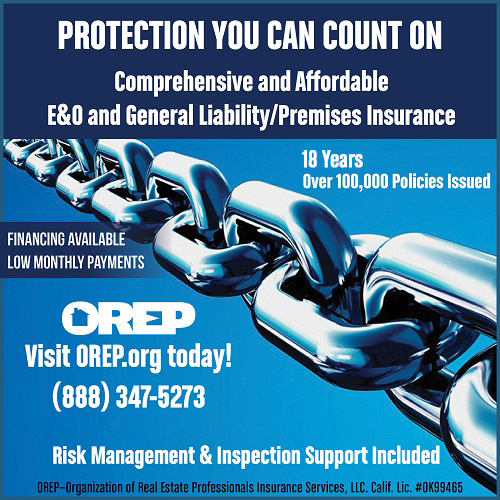 |
> E&O/GL Insurance for Home Inspectors Competitive Rates, Broad Coverage, Free Risk Management, online inspection support for tough questions, discounts on education and more… Professional Coverage, Competitive Pricing Shop OREP today! |
Inside Claims
by David Brauner, Senior Broker at OREP.org
There are two recent insurance “claims” that I’d like to share with you.
In the first, our OREP insured was “being taken to Small Claims Court” by a client alleging a non-functioning HVAC system. The homeowner is seeking costs to replace the system. In California, where the inspection took place, attorneys are not permitted in Small Claims Court. An OREP claims professional reviewed the report and other pertinent documents with the insured, free of charge, to help him prepare for his court date. The insured also was given guidance on how to prepare and what to expect. It is recommended to always consult a claims expert and/or attorney before any court appearance, even Small Claims. A referral to a local attorney was also made.
The claims manager said in part, “You will need to bring a copy of the inspection report and agreement. I would also either ask the HVAC contractor to come with you to confirm the AC unit was functioning (the insured had a third party contractor go out to inspect the system). If he is unable to attend have him provide a written statement which is notarized that confirms that fact. Using the inspection agreement and report, show the judge the sections of the agreement which describe the inspection process. You advised the age of the system and had photos of the temperature of the air coming from the registers. You are not a guarantee that the system will continue to work.”
If our insured loses in small claims, the insurance company will pay the claim after the $2,500 deductible is satisfied.
In another case, a veteran inspector went out to investigate a claim of “a leak and damaged subfloor.” The OREP inspector reported the issue to us to get it on the record. As a reminder, this is crucial because if it is reported within the policy period, the claim will be responded to by the insurance company even years later, even if the insured no longer has insurance.
(story continues below)
Many inspectors, when faced with a demand or complaint, choose to inspect the alleged problem in person. They like to evaluate the completeness and accuracy of their report, take photos and decide how to proceed. The OREP claims folks are fine with this approach as long as the issue is reported in a timely manner. If the insurance company needs to send out an independent adjuster to inspect the property pre-suit, those costs will be reimbursed within the deductible. In this case, the inspector did revisit the property. He showed the homeowner the section of the report that sets forth the limitations of the inspection and the Standards followed, which mirror those of the state (Washington). The inspector kept things friendly. It is a widely known fact that people are much less likely to sue someone the like.
After explaining the Standards and the report, the two sides agreed that the inspector was not responsible because the problem was not visible at the time of the inspection. It only became apparent later, over time, with evidence of flaking paint. The inspector followed up with a written reply summarizing what had been discussed. He also took the time to suggest a low-cost way to repair the damage.
The OREP claims folks have no objection to insureds going out to a property to evaluate a claim and to respond to the homeowner. But caution always should be exercised as well. This is language from the policy, which is present in most policies: We will have the right and duty to defend any covered “claim” brought against the “insured” even if the “claim” is groundless, false or fraudulent. The “insured” will not admit or assume liability or settle or negotiate to settle any “claim” or incur any “claims expenses” without our prior written consent.
There are several other important tips to keep in mind:
1) Make sure that everything seen and mentioned is included in the written report, especially if anything was called out verbally during the inspection. It has happened that an inspector calls something out verbally that he or she fails to note in the report. For a defense to hold up, it needs to be in writing.
2) Take plenty of pictures, which will stop a complaint in its tracks.
3) Report every issue when it happens—even seemingly frivolous ones. This makes good sense especially for OREP insureds, since the program does not raise your premium if no expense results. And pre-claims help and advice is always free.
About the Author
David Brauner is Senior Broker at OREP, a leading provider of E&O Insurance for home inspectors and other real estate professionals in 50 states (OREP.org). He has provided E&O insurance to home inspectors for over 25 years. Contact him at dbrauner@orep.org or (888) 347-5273. OREP–Organization of Real Estate Professionals Insurance, LLC. California Lic. #0K99465.
Free Risk Management Online Course Claims and Complaints: How to Stay Out of Trouble
Available Now
Presenter: David Brauner, Senior Insurance Broker OREP
David Brauner, Senior Broker at OREP, shares insights and advice gained over 25+ years of providing E&O insurance for inspectors, showing you how to protect yourself and your business. Watch Now!
Note: The Winter 2020 issue of Working RE Inspector is mailing now to over 25,000 home inspectors nationwide. OREP Insureds enjoy guaranteed delivery of each print magazine and many more benefits.



